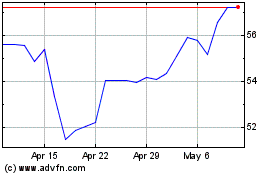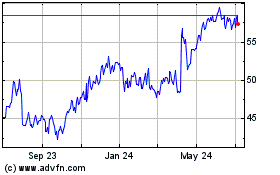SCHEDULE 14A INFORMATION
(RULE 14A-101)
INFORMATION REQUIRED IN PROXY STATEMENT
SCHEDULE 14A INFORMATION
Proxy Statement Pursuant to Section 14(a)
of the
Securities Exchange Act of 1934
Filed by the Registrant
x
Filed by a Party other than the
Registrant
¨
Check the appropriate box:
|
¨
|
Preliminary Proxy Statement
|
|
¨
|
Confidential, For Use of the Commission Only (as permitted by Rule 14a-6(e)(2))
|
|
¨
|
Definitive Proxy Statement
|
|
x
|
Definitive Additional Materials
|
|
¨
|
Soliciting Material Pursuant to Rule 14a11(c) or Rule 14a-12
|
DUCOMMUN INCORPORATED
(Name of Registrant as
Specified in Its Charter)
(Name of Person(s) Filing Proxy
Statement, if Other Than the Registrant)
Payment of Filing Fee (Check the appropriate box):
|
¨
|
Fee computed on table below per Exchange Act Rules 14a-6(i)(1) and 0-11.
|
|
|
(1)
|
Title of each class of securities to which transaction applies:
|
|
|
(2)
|
Aggregate number of securities to which transaction applies:
|
|
|
(3)
|
Per unit price or other underlying value of transaction computed pursuant to Exchange Act Rule 0-11 (Set forth the amount on which the filing fee is calculated and
state how it was determined):
|
|
|
(4)
|
Proposed maximum aggregate value of transaction:
|
|
¨
|
Fee paid previously with preliminary materials.
|
|
¨
|
Check box if any part of the fee is offset as provided by Exchange Act Rule 0-11(a)(2) and identify the filing for which the offsetting fee was paid previously.
Identify the previous filing by registration statement number, or the form or schedule and the date of its filing.
|
|
|
(1)
|
Amount Previously Paid:
|
|
|
(2)
|
Form, Schedule or Registration Statement No.:
|
Ducommun Incorporated
Additional Proxy Solicitation Materials
The
following information is being shared by Ducommun Incorporated (the “Company”) with holders of its common stock beginning on April 20, 2016 in response to recommendations by Institutional Shareholder Services (“ISS”) and
Glass Lewis.
ISS and Glass Lewis have recommended that their clients withhold votes from Jay L. Haberland and Robert C. Ducommun, two of our
current Audit Committee members, when their clients vote in connection with our upcoming annual meeting on May 4, 2016. ISS and Glass Lewis suggest that the Audit Committee failed to provide sufficient oversight over the Company’s
financial reporting process during the past year due to the existence of a material weakness in 2014 and 2015 in our internal control over the effective monitoring of the accuracy and appropriate classification of reported labor hours associated
with contracts accounted for under the percentage-of-completion method using units of delivery (the “material weakness in labor hours monitoring”).
The other members of our Board of Directors and our management strongly disagree with the recommendations of ISS and Glass Lewis. Our Board of Directors and
management are committed to maintaining a strong and sustainable internal control environment as evidenced by the remediation in 2015 of three other material weaknesses in internal controls. We would like to share with you facts about the oversight
that the Audit Committee has provided and the Company’s decision not to declare the material weakness in labor hour monitoring remediated until sufficient time had passed to demonstrate that robust controls were in place and had been fully
tested.
The scope of our material weakness is limited to accounting for the accuracy and appropriate classification of reported labor hours associated
with contracts accounted for under the percentage-of-completion method using units of delivery.
Remediation of Prior Year Material Weaknesses
We entered 2015 with four material weaknesses that we previously identified and disclosed in our 2014 Annual Report on Form 10-K (“Form
10-K”) as well as in our Quarterly Reports on Form 10-Q (“Form 10-Q”) for each interim period in fiscal 2015. In 2015 we implemented changes to improve our internal controls over financial reporting and remediated three material
weaknesses, including by:
|
|
•
|
|
Implementing additional on-going oversight, training and communication programs to reinforce the company’s ethical standards and code of conduct across the company;
|
|
|
•
|
|
Enhancing the availability of the company’s anonymous hotline for employees to communicate concerns related to questionable or unethical behaviors and activities;
|
|
|
•
|
|
Engaging third-party tax advisors to assist with the company’s methodology of estimating and reconciling tax entries and implementing new controls and improving existing controls over income tax accounts, including
controls over the reconciliation of current and deferred tax asset and liability accounts.
|
1
We remain committed to remediating the remaining material weakness in labor hour monitoring. Significant
corrective actions have been taken or are in process, including the design and implementation of our internal controls over the on-going review of the related labor distributions used in our estimates of anticipated costs used in the forward loss
reserve analysis. We are also still in the process of testing certain of these processes and procedures.
While significant progress has been made to
enhance our internal control over financial reporting relating to the remaining material weakness in labor hour monitoring, additional time is required to assess and ensure the sustainability of these processes and procedures. We expect to complete
the planned remedial actions during 2016.
Our audited 2014 and 2015 financial statements were fairly presented.
In both our 2014 and 2015 Forms 10-K, we noted that notwithstanding the material weaknesses, the consolidated financial statements fairly presented, in all
material respects, our financial position, results of operations and cash flows in conformity with U.S. generally accepted accounting principles.
PwC’s opinion on the Company’s consolidated financial statements was unaffected.
Our 2015 Form 10-K included the following statement by PricewaterhouseCoopers LLP (“PwC”): “We considered this material weakness in determining
the nature, timing and extent of audit tests applied in our audit of the 2015 consolidated financial statements, and our opinion regarding the effectiveness of the Company’s internal control over financial reporting does not affect our opinion
on those consolidated financial statements.”
We have been transparent about our approach to our remediation plans and progress, and we have taken
affirmative steps to enhance our internal controls.
In our 2014 and 2015 Forms 10-K, we disclosed that we were implementing controls to address the
material weaknesses and strengthen our overall internal control environment. For the remaining material weakness that had not been fully remediated, we specifically redesigned our internal controls over the accounting for contract loss reserves,
including an on-going review of the related labor distributions to estimate the anticipated costs used in forward loss reserve analysis. We also noted that additional time will be required to assess and ensure the sustainability of these processes
and procedures.
While we made significant improvements in the internal controls through December 31, 2015, we continue to evaluate the
effectiveness of our new internal controls to be able to confirm that a sustainable, controlled process is fully in place.
2
The Audit Committee had extensive discussions with both management and PwC regarding the status of remediation
throughout 2015 and in 2016 with respect to the status of remediation at year-end 2015, including the time necessary to ensure the efficacy and sustainability of our new processes and controls.
In our 2015 Form 10-K, we carefully explained our decision to continue our work to confirm the efficacy and sustainability of our new process and controls
over labor hour monitoring, which can only be proven by repeated success over a prolonged period of time:
“While significant progress
has been made to enhance our internal control over financial reporting relating to the remaining material weakness, additional time will be required to assess and ensure the sustainability of these processes and procedures. We expect to complete the
planned remedial actions during 2016.”
Our Audit Committee has been vigilant in its oversight of the Company’s financial reporting process
generally and the remediation process specifically.
Our proxy statement discloses that the Audit Committee met 10 times during 2015. The Audit
Committee has met two times thus far in 2016. During the course of these meetings, the Audit Committee devoted considerable time to oversight of the Company’s ongoing financial reporting process and the remediation of the material weaknesses in
internal controls over financial reporting. During those meetings, management and the Audit Committee discussed, among other topics, the accounting function’s structure, processes, information management systems, staffing and skills. The Audit
Committee also received regular reports on the status of the remediation of the previously discussed material weaknesses, as well as the design and testing of the Company’s internal control over financial reporting.
Audit Committee members Jay L. Haberland and Robert C. Ducommun are eminently qualified and should be reelected.
Our proxy statement contains detailed information about the qualifications of all our directors. Our Audit Committee members are Richard A. Baldridge, Jay L.
Haberland and Robert C. Ducommun. Mr. Haberland is the Chairman of the Audit Committee.
Our Board of Directors has determined that all members of
the Audit Committee are “financially literate” in accordance with New York Stock Exchange listing standards and that Mr. Haberland is an “audit committee financial expert” within the meaning of SEC regulations.
Mr. Haberland is a certified public accountant. Mr. Haberland retired as the Vice President, Business Controls of United Technologies Corporation.
Mr. Haberland was previously the Chief Financial Officer of Sikorsky Aircraft Corporation, a subsidiary of United Technologies Corporation, and Vice President, Controller and Chief Accounting Officer of United Technologies Corporation. As the
former Chief Financial Officer of one of the world’s largest helicopter manufacturers and the former Chief Accounting Officer and head of business controls of a world-wide diversified manufacturer, Mr. Haberland has significant expertise
in financial reporting, internal controls and accounting matters.
3
Mr. Ducommun is a business advisor. Mr. Ducommun was previously the Chief Financial Officer for several
private companies and a management consultant with McKinsey & Company. As a former management consultant and Chief Financial Officer, Mr. Ducommun has substantial experience with financial reporting and accounting.
In summary, the Company’s shareholders are fortunate to have such talented, dedicated, globally experienced, and thoughtful individuals serve as our
directors.
4
Ducommun (NYSE:DCO)
Historical Stock Chart
From Mar 2024 to Apr 2024

Ducommun (NYSE:DCO)
Historical Stock Chart
From Apr 2023 to Apr 2024
